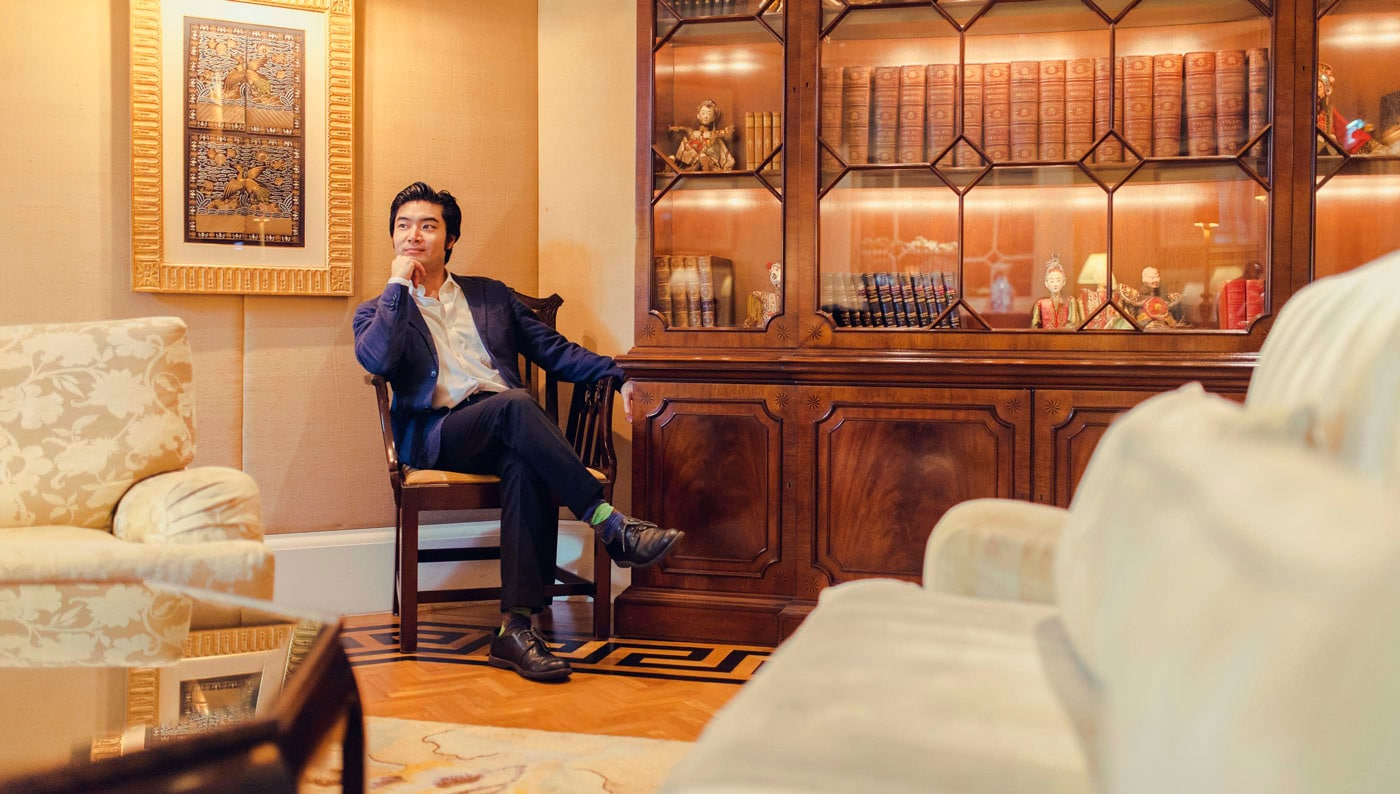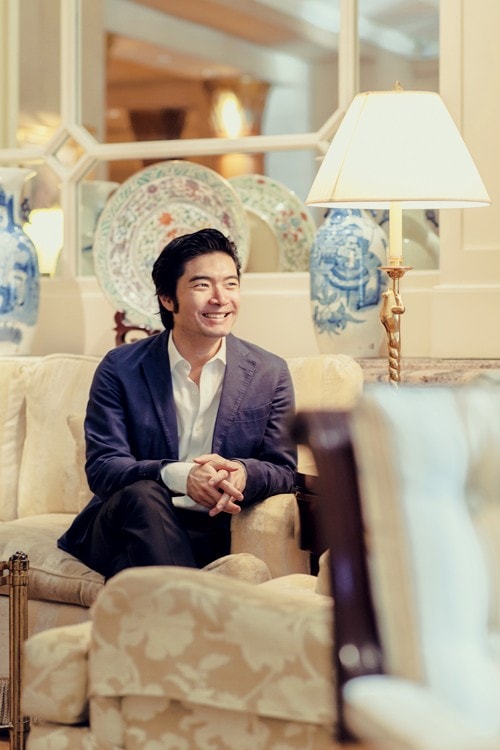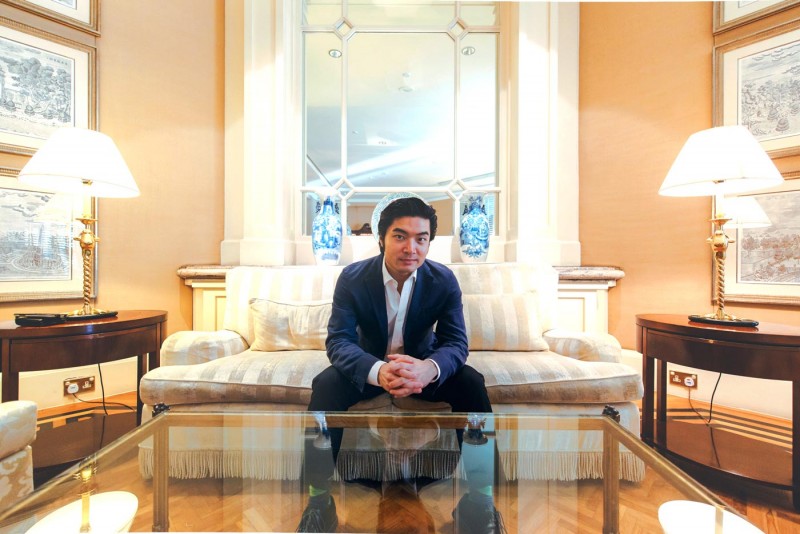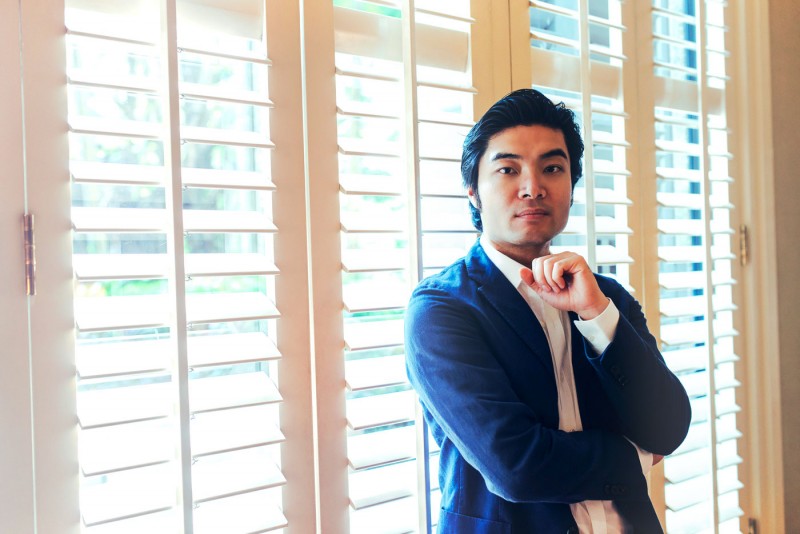Darrell Ang: The Music Maestro

“I am so sorry.” Those are the first four words that Darrell Ang says to me before we engage in some cheek kissing. “My cab broke down and I had to flag down another. Unbelievable.” The additional waiting time did not dampen my enthusiasm one bit. A talented man like Darrell, who speaks six languages and has a long list of prestigious accomplishments, is certainly worth the wait.
Offstage, Darrell is just as charming, possessing a certain je ne sais quoi, which instantly draws you in – even without his coat tails flying in the air. As he scans the menu for breakfast options, he casually mentions that I am lucky to catch him before he jets off to France. The waitress approaches and his supremely hard to follow travelling schedule gets interrupted. All I know is that he is one busy man, with probably a million frequent flyer miles.
“Scrambled eggs and one au pain chocolat, please,” says Darrell, in a flawless French pronunciation. Despite being born in Singapore, it doesn’t come as a surprise. After all, he spends quite a fair bit of his time in France, being the music director of Orchestre Symphonique de Bretagne. “Aren’t you having anything?” he asks, eyes flickering with intensity. I play it safe and request for coffee.
WY-LENE YAP: I read that you are listed in Her World magazine as one of Asia’s “50 Men We Love”. For all your fans out there, are you single?
DARRELL ANG: I’m not married. [laughs] So that would classify me as single.
WY-LENE: How about a significant other?
DARRELL: Yeah, I have a significant other but it’s a long distance relationship. Sometimes, it’s hard to find time to make things work. But if your heart is in it, you will make it work.
WY-LENE: Where is home? Singapore or France?
DARRELL: I am not physically at a particular place for a long period of time. I have an apartment in France. But if I have to choose, it will have to be Singapore because my family is here.
WY-LENE: Describe what “music” means to you.
DARRELL: It is a means of expression, a language, a form of communication, which the musician uses to express not just his or her feelings but the philosophy, character, history etc… that is seen through the eyes of the composer. It could be a vehicle for the performer or it could be a vehicle which tells the listener about a certain product. In summary, music is a means to communicate an idea.
WY-LENE: Did your love for music start at a tender age of four?
DARRELL: Actually, at four, I hated music. My parents gave us (my sister and I) music lessons, but I was more interested in other things like art and the wildlife. I did not spend a lot of time on music as compared to my sister.
WY-LENE: Is there a particular age where you discovered your love for music then?
DARRELL: The turning point was probably in primary six, when I was singing in the church choir. From there, music started to make sense to me.
WY-LENE: So you had a spark?
DARRELL: That was just a small turning point. The spark only came when I had my first crush. I wanted to impress her with music so I took up the drums, the trumpet, and later, the bassoon. I realised on a subconscious level that I could not only impress her, but also use it to express my feelings. And that’s when music took a stronger hold on me.
WY-LENE: Out of curiosity, how many musical instruments can you play? I know that you play the violin, piano, and bassoon.
DARRELL: I used to play the violin, but not anymore. I am learning the Erhu now because I have a personal fondness for it. It is a very poetic instrument that produces a beautiful sound. Sometimes, it puts me in a state of isolation, which I enjoy – allowing me to therapeutically relax.
WY-LENE: Why didn’t you go down the more ‘conventional’ path of wanting to be an acclaimed pianist or violinist?
DARRELL: Playing instruments by myself did not ignite a strong love for music. However, it was more fun and enjoyable when I was playing in the band in secondary school. Subsequently, when I started conducting, it gave me an added impetus to discover music. Conducting an orchestra and making music with people allowed me to connect more with music and that created a special feeling.
WY-LENE: Do you have a particular classical music era that you like the most?
DARRELL: Not really, because there are so many geniuses and masterpieces throughout history. I don’t have a favourite as I feel close to all the eras. However, if I were a performer, I would choose the Late Romantic/ 20th century era.
WY-LENE: Did you go to St. Petersburg because you wanted to follow the footsteps of IIya Musin?
DARRELL: I wanted to study under him, but it was too late. He died in 1999. However, I had seen two of his most famous students conducting in Europe, and I was so fascinated by their styles and techniques as their pieces were so beautifully choreographed that I had to go to St. Petersburg.
WY-LENE: Tell me more about your experience in St. Petersburg and living in Russia.
DARRELL: It was hard to live in Russia; I mean it’s hard for anyone who is not Russian, especially someone from Singapore who has a comfortable life. Comfortable meaning your basic necessities are easily accessible. When I was a student, the first 6 months to a year were very hard. I lived in a student hostel. It was very basic – my bed was a plank of wood, and the floors were broken tiles. The harshest part was the extreme weather: I was ill most of the time because during winter, it was minus twenty outside, but in my room it was minus forty. I did not have a heater or any hot water.
WY-LENE: How did you survive?
DARRELL: I almost thought that I couldn’t but you find ways and means to get out of the situation. For example, I would have to boil water and put it in a tub in order to take a bath. Eventually, I moved out.
WY-LENE: Your biodata is simply outstanding. I can’t keep track of the number of awards and accolades that you have under your belt. Out of all of them, which one means the most to you?
DARRELL: None of them. When I win an award, the euphoria only lasts for three days. The significance of an award is not long lasting. It is something that people remember you by – a memory. Winning competitions might open doors for you but sustaining your career is a separate matter altogether. If you can’t do that, then your award means nothing.
WY-LENE: How about your most memorable performance?
DARRELL: That’s a difficult question for a performer because once a concert is over; you focus on the next one. And, I have concerts every week. Every concert is an event for me. It has to be because it is my job and profession so I try to make every concert outstanding. As a result, I don’t remember anything once they are over.
WY-LENE: Any rituals before you take centre stage?
DARRELL: I used to but not anymore. I have trained myself for the past six years to get rid of any feelings of nervousness and be focused.
WY-LENE: What is a role of a conductor? Is he more of a timekeeper or a showman who gesticulates furiously?
DARRELL: Neither. The conductor is like a director on a movie set. He has the script of every actor for each scene and when he says action, all the actors start to do their own thing. The director doesn’t interrupt at all. Before the action takes place, he is giving out instructions. Those are my rehearsals. They are all professional musicians and they know their roles. My job is not to get in their way but to ensure that we perform a given piece in a unified manner and we all move as one. Essentially, there is one idea going throughout the performance and not a collective of ideas. Like a film director, once I say “action”, I stay a little out of the way and let things happen. Along the way, I sculpt, shape, and may occasionally pull out different details that we didn’t rehearse – that’s important, when you do something surprising (nothing too scandalous, of course) and it makes the performance come alive.
WY-LENE: I read that performances led by beginner conductors always have a strange blank quality. What are your thoughts on that?
DARRELL: It really depends on the person, if he is musically inclined and what he wants to do with the music. It is hard to define what is strange and blank about a performance. But as a relatively new conductor, you obviously lack the experience so you are trying to find yourself and the musicians are also trying to figure you out. Naturally, the sparks don’t fly immediately.
WY-LENE: How does one become ‘Darrell Ang’?
DARRELL: Wow. Let’s see: through sheer perseverance, a lot of hard work, determination and very little sleep. Being a conductor from Singapore, or rather, a musician from Singapore is very tough. Singapore is so divorced from all the cultural happenings elsewhere that if you were to go to Europe or North America and introduce yourself as a Singaporean musician, people struggle to think who else is there as we don’t have much history. However, if I’m a Russian and say I’m a Russian musician, outsiders immediately know who I am because I come from a certain lineage –Tchaikovsky, Rachmaninoff, Stravinsky… you also know what kind of sound I make as a pianist or violinist because of my training. It is hard to create an identity for myself and I have spent the past few years shaping that but I don’t have all the answers, as it is still a work in progress. Personally, I represent something contemporary and forward-looking – being from Asia, yet educated in Europe and America, inheriting their best practices.
WY-LENE: You have played an integral role in the Singapore Symphony Orchesta. But I know that you have decided to limit your appearances in Singapore by taking a hiatus until 2015. Any reasons why?
DARRELL: Well, when I had a contract with the SSO, it was for five years (as an Associate Conductor) and a minimum of ten weeks a year. If you put that together with my other international appearances, it was almost impossible to juggle. Singapore is so far away and I had to travel thirteen to fifteen hours every month. So I decided to get my life in order and the first thing I did was to limit my appearances in Singapore. I also felt that I had done a lot here and wanted to take a break. However, when I am back next year, I would like to recreate something new – not just for the SSO but also for Singapore.
WY-LENE: Do you think the SSO has achieved a certain standard that is comparable to the Berlin Philharmonic or even the London Symphony Orchestra?
DARRELL: The SSO has come a tremendously long way. It is now on the same level as many good European orchestras and it is definitely one of the top orchestras in Asia too. Singaporeans should be very proud of what we have achieved in such a short period.
WY-LENE: Any upcoming concerts?
DARRELL: You can check out my website. I got some interesting concerts that I am looking forward to – the world premiere of Tan Dun’s Double Bass Concerto in Liverpool (February) and in March, I am inaugurating the opening of the new Philharmonic concert hall in Paris with my orchestra.







